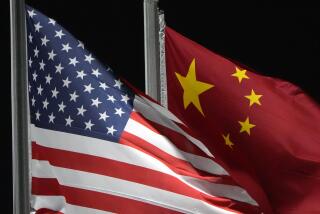Israeli Arms Technology Aids China : Military: U.S. officials say the growing cooperation undercuts sanctions imposed after Beijing crushed protests. Washington has objected.
WASHINGTON — In the year since the Bush Administration blocked U.S. military sales to China after the crushing of democracy protests at Tian An Men Square, Israel has emerged as the most important foreign supplier of advanced military technology to China, officials in the Bush Administration and Congress say.
According to these sources, Israel increasingly is providing China with military technology that China is unable to obtain from the United States. Some U.S. defense specialists say that Israel may be supplying China with engine technology to build a new combat jet fighter.
A senior Administration official said the United States has made clear to Israel that it strongly opposes the new military cooperation, which undercuts the intended effect of the year-old U.S. sanctions.
“This is over our objections,” he said. “I’d rather not get into the tit-for-tat on this. But they know our views.”
Bush Administration officials insist that Israel is not operating as a proxy for the United States in the military sales, as Israel did when it supplied arms to Iran during the Iran-Contra affair.
Although Israel and China have no diplomatic relations, the two countries are known to have carried out quiet military cooperation with one another for nearly a decade.
The growing U.S. concern about Israel’s actions was prompted by recent Israeli technology transfers to China and by the opening of an office of the Israeli Academy of Sciences in Beijing.
“They (the Israelis) are moving in so many areas, it’s a matter of sort of limiting, somehow, those areas,” said the senior Bush Administration official. “They’ve opened this institute in Beijing which is facilitating a whole range of military-to-military cooperation between Israel and China.”
A spokesman for the Israeli Embassy in Washington declined to comment on Israeli military sales to China or the Bush Administration’s objections to them.
According to Western and Asian intelligence specialists, Israel in recent years has provided China with some of the advanced technology, such as electronics and guidance systems, needed to modernize China’s existing jet aircraft and missiles.
Military cooperation with Israel also enables China to obtain advanced technology at relatively low cost.
“You can take a plane that costs $1 million, spend $10 million upgrading it with advanced electronics, and the result will be a plane that would cost you $25 million if you bought it new,” one Asian diplomat said.
“The Chinese probably see Israel as a back door to U.S. technology that the United States won’t sell them,” observed Morton S. Miller, a retired State Department intelligence official who published a report on Israeli arms sales to China for the Arms Control and Disarmament Agency.
For Israel, cooperation with China is said to provide cash and much-needed business for its arms industry. It also enables Israel to obtain valuable intelligence about missile programs in China, a leading arms supplier for several of Israel’s adversaries in the Middle East.
“The Israelis wanted to get into the Chinese system, to know who is doing what for whom and where things are going,” said one Western intelligence official.
Another Bush Administration official suggested that Israel’s cooperation with China also may accomplish broader strategic objectives by giving Israel at least a degree of leverage over China’s export of missiles to the Middle East.
The official speculated that Israel’s cooperation with China may have been one factor that has restrained China from exporting its newly developed M-9 short-range missiles to countries such as Iraq and Syria.
“You can work out the logic yourself,” the official said. “China needs the technology from Israel, and Israel wants to make sure its enemies don’t get new Chinese missiles.”
Three years ago, the United States objected when it learned that China had sold CSS-2 intermediate-range missiles to another Israeli adversary, Saudi Arabia.
Before the United States gives advanced military hardware or technology to Israel, it insists on obtaining assurances that Israel is the end-user and will not pass the know-how on to other countries.
U.S. and Asian diplomatic sources said it would be difficult to prove that Israel has violated these assurances in its military transfers to China.
“Obviously, the Israelis have a lot of things that come from us,” said one Defense Department official. “It’s hard to tell which of the stuff they are giving China is indigenous and what comes from us.
” . . . They (the Israelis) are never caught red-handed. They are never found with a missile in their hands. It’s always (Israeli) technicians and technology transfer. When the Israeli technicians go to China, it’s hard to tell what else is being discussed.”
China regularly portrays itself as a strong friend and supporter of the Palestine Liberation Organization and of Arab governments in the Middle East. But Israel gradually has maneuvered itself into a position where it is now, in Miller’s words, “a very major supplier” of military technology to China.
By the early 1980s, Israel and China were working together on military projects. The first public demonstration of their cooperation came in October, 1984, at a military parade in honor of the 35th anniversary of the People’s Republic of China. Surprised foreign military attaches in Beijing spotted self-propelled 105-millimeter guns and cannons of Israeli design mounted on China’s T-59 tanks.
One Western official assigned to keep track of Israeli military activities in China visited China’s tank production facilities in the city of Baotou and found foreigners who he believed were Israelis working at the plant. The Chinese tanks were being equipped with Israeli laser range finders.
In the early years of their military cooperation, China and Israel reportedly dealt with one another through third countries.
“There was an Austrian connection,” said one Asian diplomat. “They were doing it through Vienna.”
But as the cooperation deepened, the Israelis began to carry out more and more business inside China. China opened a travel office in Tel Aviv two years ago, enabling Israelis to obtain visas and travel freely to China.
In Beijing, Israelis operated at first through private trading companies and, since early this year, through the liaison office of the Israeli Academy of Sciences, located in Beijing’s Jianguo Hotel.
Two Israeli scientists moved into the new Beijing office last February, and the office is formally opening its doors this week. The office is said to be responsible for handling academic exchanges between China and Israel.
When the Bush Administration suspended U.S. military sales to China a year ago, the action blocked 493 license and contract agreements in which American companies were selling equipment or technology to China, according to State Department figures.
Since that time, a State Department spokesman said, 18 special exceptions have been granted. However, department officials emphasize, the exceptions are given only when American technology is primarily designed for commercial use in China, rather than for military or intelligence work.
Amid the continuing uncertainty over the duration and impact of the Bush Administration’s military sanctions, China earlier this year shelved a deal with the United States under which the Grumman Corp. was to supply advanced radar and electronic equipment to modernize China’s F-8 fighter planes.
Over the last two years, there have been unconfirmed reports that Israel was helping China develop a new jet fighter with technology from the Lavi, an advanced combat aircraft that Israel attempted to build with U.S. financial backing. In 1987, the United States withdrew support for the Lavi project, and Israel was forced to cancel it because of delays and rising costs. The advanced engine technology for the Lavi came from the United States.
“The Chinese have very definitely been in the market for a new fighter plane,” said Miller. “There have been reports that they are developing a new plane called the F-12. If it wound up looking like the Lavi, I wouldn’t be surprised.”
Times staff writer Dan Williams, in Jerusalem, contributed to this story.
More to Read
Sign up for Essential California
The most important California stories and recommendations in your inbox every morning.
You may occasionally receive promotional content from the Los Angeles Times.










